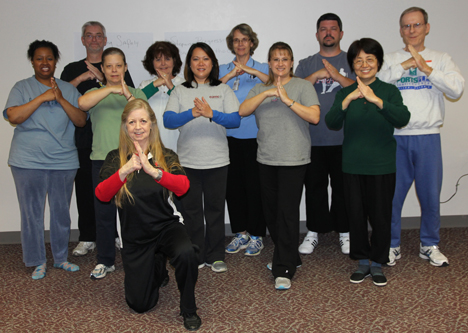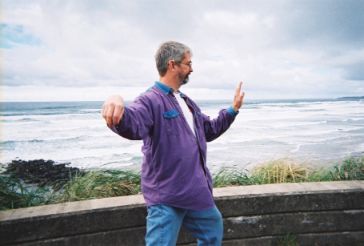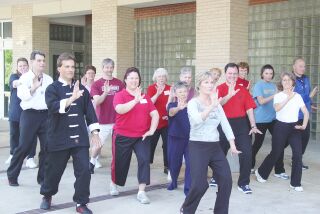
NORTHWEST FLORIDA TAIJIQUAN CLUB
Tai Chi for Health classes continue each Tuesday at 8 a.m. at the Washington County Public Library in Chipley. Join us if you want to learn a fun and gentle way to keep fit. Tai Chi is great for seniors and those with arthritis or diabetes. We practice the Tai Chi for Arthritis form designed by Dr. Paul Lam for the Arthritis Foundation, and advanced students will learn the Yang 24 form and the Sun 73 form.

WHAT IS TAI CHI?
(From Harvard Women's Health Watch, November 1996)
For centuries, tai chi has been a daily ritual for millions of Chinese, who at dawn and dusk can be seen practicing practicing this slow, graceful form of exercise in their parks. Today, as word of the possible health benefits of tai chi spreads, the ancient Chinese art is becoming a daily routine for many Americans as well.
The full name, tai chi ch'uan, also written taijiquan, is often translated as "Chinese shadow boxing." Yet, while tai chi is considered a martial art, it differs from others like karate in that its execution involves no explosive kicks or punches. Instead, tai chi consists of sequences of smooth, flowing movements called forms that are inspired by animals in nature. Each of the 60 or so most commonly practiced forms has a name that is both evocative and descriptive, such as Grasp a Sparrow's Tail, Parting a Wild Horse's Mane, and Stork Spreading Its Wings.
As the titles of the forms suggest, tai chi is better observed or experienced than explained. Those pressed to give a verbal description have characterized it as state of constant, unified motion in which the goal is not to isolate or concentrate on individual parts of the body but to be aware of the hands, head, body, and limbs in concert. The leg serves as a base and the waist as the axis of movement.
Forms range in difficulty from those that take a minimum of skill to perform to those that require exquisite grace and balance to execute. A tai chi routine can be tailored to Suit the practitioner, employing forms that are appropriate for one's level of skill. However, doing any of the forms properly requires balance, muscle control, concentration, and deep, uniform breathing.
Tai chi is an extremely convenient form of exercise. A typical routine takes only about 10 minutes to perform-preferably shortly after rising and before retiring-and requires only 4-5 feet of space. No investment in athletic gear is necessary: the only necessities are loose clothing and flat shoes with soles that won't stick to the floor.
Health Benefits

Historically, the Chinese have used ta chi to treat a host of health problems, including circulation and nervous system disorders, addictions, muscle injuries, arthritis, and even asthma. Although Chinese literature, books, web sites, and alternative medical publications such as Qi - The journal of Traditional Eastern Health and Fitness abound with accounts of tai chi's psychological and physiological benefits, only recently has the discipline been subjected to western scientific scrutiny. Nonetheless, the few reports in the medical literature indicate that tai chi has salubrious effects, particularly for people in their 70's and 80's.
The May 1996 issue of The Journal of the American Geriatrics Society carried one such study, conducted by researchers at Emory University. That investigation determined that tai chi instruction improved balance and strength in people age 70 and older, reducing the risk of falls in that age group. Of 200 women and men, those who were randomly assigned to undergo tai chi training for 15 weeks reduced their risk of falling by 47.5%. The tai chi group also had significantly lower blood pressure in response to aerobic exercise at the end of the program than they did at the beginning.
In addition to these physical gains, the tai chi practitioners became more confident. The fear of falling decreased significantly during the program. Each of these improvements was significantly higher in the group who practiced tai chi than in a control group who, during the same period, participated in discussions on topics of interest rather than in an exercise program.
An earlier study, published in the November 1995 issue of the same journal reported that practicing tai chi regularly may delay the decline of cardiopulmonary function in older adults. The study evaluated two-year trends in cardiopulmonary function among tai chi practitioners and a group of sedentary men and women who were matched by age, sex, and body size. Both groups averaged 64 years of age. One group had been performing tai chi for an average of 6 years and practiced the discipline an average of five times a week during the study. Although individuals from both groups exhibited a decrease in cardiopulmonary function over the two-year period, the decline was significantly higher among the sedentary subjects.
Stress Reduction
The only reported investigation to evaluate the role of tai chin stress reduction was conducted at La Trobe University in Australia In the early 1990's. In that study, 48 women and 48 men who had practiced tai chi for several years watched disturbing films and performed mental calculations on four separate stress-inducing sessions. At the end of each session every participant was assigned to one of four stress-reduction programs-tai chi, meditation, brisk walking, or reading neutral material. Tai chi was found to be as effective as meditation and brisk walking and more effective than reading in reducing levels of catecholamines, or stress hormones.
There are no reports of injuries related tai chi in the medical literature. If it appeals to you, there is little reason not to try it as a means of increasing strength, flexibility, balance, and equanimity.
The best way to learn tai chi is to get personal instruction and to practice every day.

TAI CHI PROGRAM AT NORTHWEST FLORIDA TAI CHI
Randal Seyler teaches Tai Chi in Northwest Florida. He is a certified Tai Chi instructor for the Arthritis Foundation and a member of Dr. Paul Lam's Tai Chi for Health Community, and has been playing and teaching tai chi since 1990.
He began what was, to his knowledge, the first high school martial arts club in Arkansas in 1975, when he started an after-school judo club at his high school while just a sophomore at Pocahontas High. Upon graduating high school in 1977, he went into the Navy and soon started training in tae kwon do. In 1978, he began studying Okinawan shorin-ryu karate, an art he holds a 2nd degree black belt in and which he still practices and teaches today. In the mid 80s, Seyler discovered Taiho-Ryu karate, established by Arkansas martial arts legend Bo Hardy of Pine Bluff, and also earned his black belt in Taiho-Ryu.
While in graduate school at West Virginia University in Morgantown, Seyler began studying the Tai Chi 24 Yang form with Mike Snyder of the West Virginia Martial Arts Association Club, a sifu of tai chi and chi lin kung fu. He later met Dr. Zhou Cheng, then a doctoral student in the WVU math department, who taught Seyler the traditional Yang long form. Dr. Cheng’s master was a direct student of Yang Cheng Fu and a kung fu brother to Cheng Man Cheng.
In 2004, Seyler became interested in the Tai Chi for Arthritis program and wanted to offer the classes locally. An arthritis patient for over a decade, Seyler had found that tai chi helped control his own pain and stiffness and wanted to help other arthritis patients learn tai chi.
He became certified as a level I instructor early 2004 under the Dr. Lam program studying with Master Instructor Troyce Thomer. He has kept up his TCA training under Senior Trainer Joanne Zeitler of Heber Springs, Arkansas, and Master Trainer Sheila Rae of Memphis, Tennessee, recently recertifying in TCA under Rae in Opelika, Ala.
For information about the Tai Chi for Arthritis program, contact Seyler at (479)595-0054.
“Tai Chi is a great way to reduce stress, decrease pain, increase flexibility and meet new friends. Come and enjoy the wonderful art of Tai Chi.”
San Diego Tai Chi
William CC Chen Tai Chi
Dr. Paul Lam Tai Chi
Wing Lam Kung Fu
Dr. Yang Jwing Ming